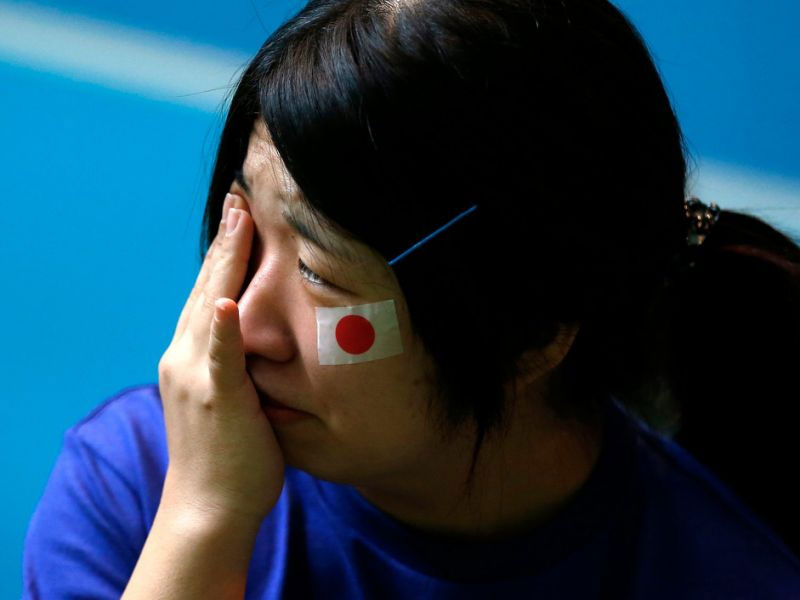
A Japanese soccer fan after Japan loses its 2014 World Cup soccer match against Colombia.
It’s midnight in Tokyo and Takehiro Onuki has just left the office, 16 hours after his shift began.
Onuki, a 31-year-old salesman, is headed to the train station to catch the 12:24 a.m. train, the last one of the night, back to his home in Yokohama. The train will quickly fill up with other professional working men.
At about 1:30 a.m., after having made a pit stop at a convenience store to grab a sandwich, Onuki arrives home. When he opens the bedroom door, he accidentally wakes his wife, Yoshiko, who just recently fell asleep after working an 11-hour day. She chides him for making too much noise and he apologizes.
Then, with his food still digesting and his alarm set for 7 a.m., he creeps into bed, ready to do it all again tomorrow.
Over the past two decades, stories like the Onukis’ have become commonplace in Japan. Young couples are fighting to make relationships work amid a traditional work culture that expects men to be breadwinners and women to be homemakers. It’s a losing battle. Many newlyweds are forced to watch their free time disappear, surrendering everything from the occasional date night to starting a family.
The daily constraints have made for a worrisome trend. Japan has entered a vicious cycle of low fertility and low spending that has led to trillions in lost GDP and a population decline of 1 million people, all within just the past five years. If left unabated, experts forecast severe economic downturn and a breakdown in the fabric of social life.
Mary Brinton, a Harvard sociologist, tells Business Insider that the situation will get only worse until Prime Minister Shinzo Abe and his cabinet get with the times. Of the ongoing crisis, she says, “This is death to the family.”
An employee prepares to leave the office after working hours on the company’s “no-overtime day” in Tokyo.
The demographic time bomb in action
Economists have a name for countries that contract because of these swirling forces: “demographic time bombs.” In these nations, falling spending shrinks the economy, which discourages families from having kids, which shrinks the economy further. Meanwhile, people are living longer than ever before.
“An aging population will mean higher costs for the government, a shortage of pension and social security-type funds, a shortage of people to care for the very aged, slow economic growth, and a shortage of young workers,” Brinton says.
Demographic time bombs are hard to defuse because they form over years, sometimes decades. In Japan’s case, the story begins in the immediate aftermath of World War II.
Source: https://sg.finance.yahoo.com/news/death-family-japan-fertility-crisis-150000177.html
